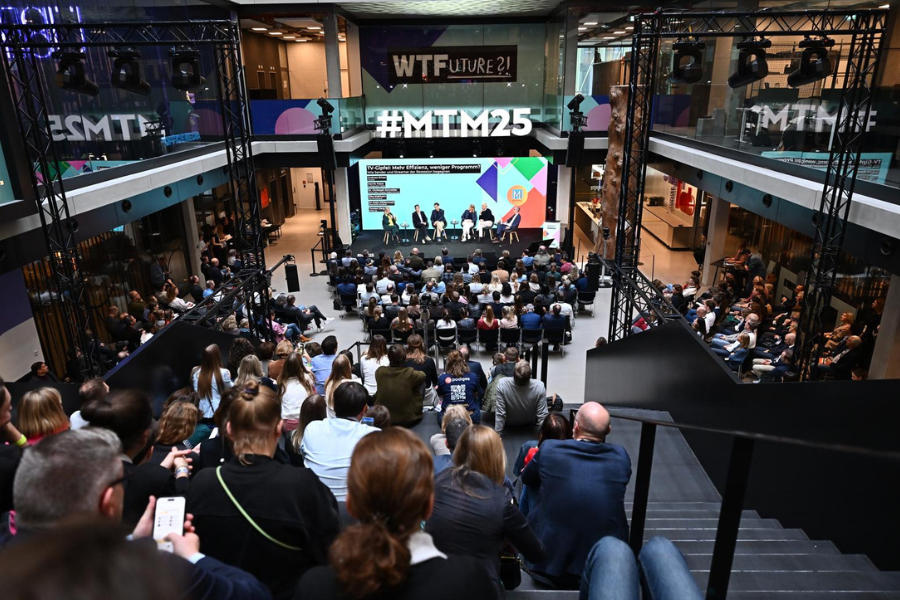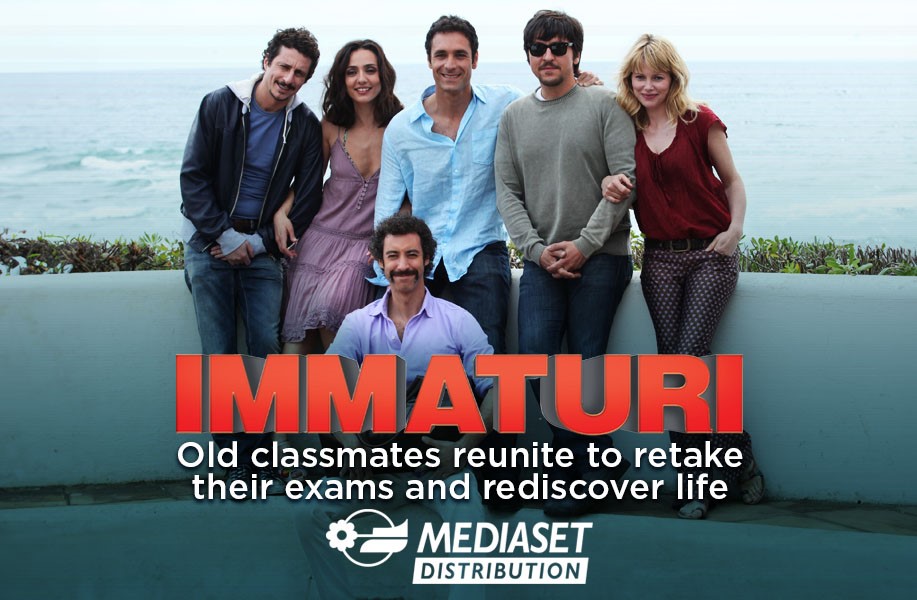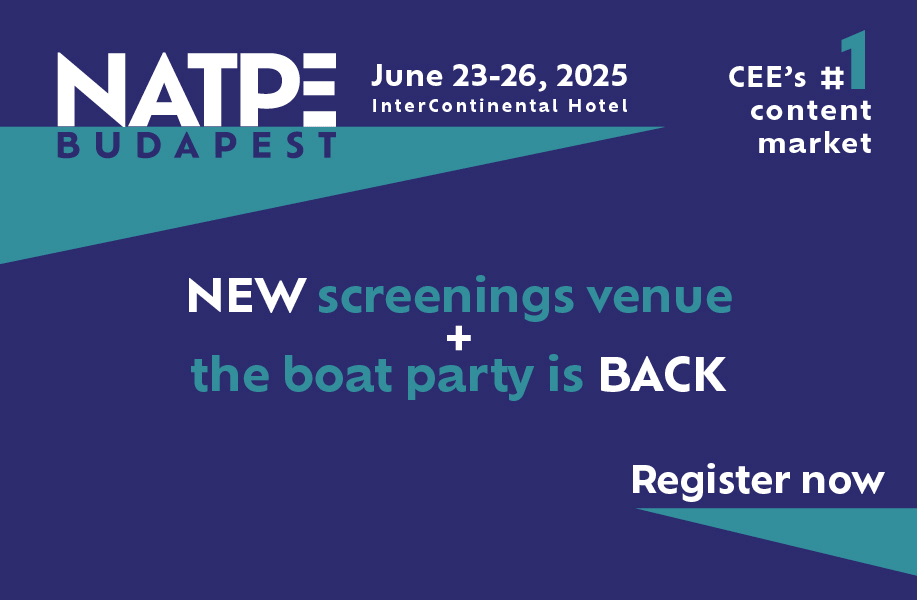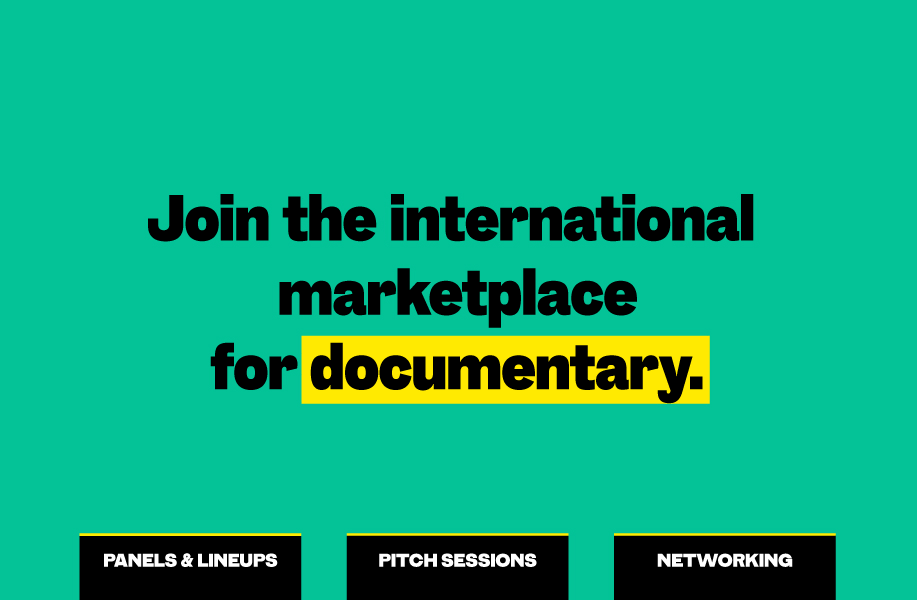The Media Days kicked off with a bang: on the eve of the 39th Media Days Munich, Media For Europe (MFE) dismissed the entire board of ProSiebenSat.1, which has its headquarters just outside Munich and is one of the largest employers in the industry. The consequences of consolidation in the German media sector are also expected at the neighboring headquarters of Sky Deutschland, which has been bought by RTL. However, the antitrust authorities still have to approve the takeover.
In addition to the ubiquitous consolidation, old and new partnerships were also one of the dominant topics at the conference, which attracted 350 speakers and over 5,000 visitors. All possible combinations of cooperation are now conceivable and are also being implemented. As of this week, RTL+ can be booked via Prime Video Channels. The value of exclusivity is giving way to economic constraints.
This year's “Medientage München” kicked off with the traditional Media Days Summit – and the tone was clear: in times of digital upheaval, polarized public opinion, and global platform dominance, responsibility, attitude, and trust are more important than ever.
Dr. Thorsten Schmiege, President of the Bavarian Regulatory Authority for New Media (BLM), emphasized at the outset that what is needed is “an informed, not a heated media landscape.”
In his speech, Dr. Wolfram Weimer, Minister of State for Culture and Media, outlined the tension between the national media industry and global platforms: “During my eight-minute speech, Google earns six million euros.” He announced that talks with international streamers had been concluded and that “good news” on film funding would follow “in the next few days.”
Florian Haller, CEO of the Serviceplan Group, whose premises hosted the Media Days, called for a change of perspective in the media sector: “Trustworthy media is a better term than quality media.” POLITICO CEO Goli Sheikholeslami reminded attendees of the importance of global perspectives: “The transatlantic story is more important than ever.” At the same time, she warned against social polarization caused by social media.
Comedian Oliver Kalkofe provided a satirical and thought-provoking impulse by addressing the tension between freedom of expression and public outrage. “Cancel culture has always existed—and it has always been wrong,” he said. His appeal: "We can say anything—but we should also think before we speak. And if you say something, you should stand by it.“ He called on media makers ”not to jump on every bandwagon of outrage,“ but to take their own responsibility seriously: ”We control how the audience perceives the world – even in entertainment."
The subsequent discussion round at the media summit clearly showed how much pressure the German media industry is under to keep pace with technological, economic, and social changes.
Stephan Schmitter, CEO of RTL Germany, called for greater speed and regulatory fairness in competition: “We are having very good discussions with the antitrust authorities about the takeover of Sky – but it is simply taking too long.” He added that in the meantime, Netflix and Amazon would merge their DSPs overnight – without any regulation. “We simply need speed now.”
Schmitter was particularly critical of the impact of AI-generated summaries in the search area: “No one clicks on the link anymore – they lose traffic, and we don't know how the algorithm is controlled. That has a huge, huge impact.” At “Stern”, the decline is already noticeable: “We are seeing a massive 30 to 40 percent drop in reach.” His countermeasure: trust – “in brands, in people.” Schmitter called for a “new sense of togetherness” in the industry.
Jagoda Marinić, writer, journalist, and podcaster, urged in her contribution to the social debate culture that we learn from the mistakes of the USA: “We must not get lost in heated debates.” She warned against increasing polarization, which suppresses nuance and replaces objective discussion with a “culture war from the right.” For the media, therefore, “transparency is becoming even more important—as is proximity.”
The streaming market between cooperation, consolidation, and cost pressure
Under the title “WTStream – Where the streaming market is headed,” leading figures in the German TV industry discussed strategies, partnerships, and prospects in an increasingly saturated market. Thomas Lückerath, editor-in-chief of DWDL.de, led the discussion with his usual incisiveness – and commented on the current industry trend toward “frenemy co-opetition – the main thing is that we have a new buzzword again.”
Nicole Agudo Berbel, MD & Chief Distribution Officer at Seven.One Media, emphasized the importance of cooperation and the success of Joyn: “We are on the right track and have partnerships with almost everyone on the panel.” At the same time, she pointed out the challenges of the linear TV advertising market: “The pressure is enormous – advertising-financed models are crucial.” She described her partnership with Telekom as “strategically very important” and also expressed her conviction on the subject of windowing: “It makes perfect sense to target different audiences.”
Matthias Heinze from Warner Bros. Discovery drew an international comparison in film funding: “Spain, Hungary, Czechia, and the United Kingdom are doing a better job than Germany when it comes to incentive models.” With regard to the upcoming launch of HBO MAX in Germany, he announced: “Early 2026 – this will be officially communicated soon.” From the outset, the offering will also rely on an advertising-financed tariff and he pointed to the advantages of a later market entry.
Henning Nieslony, Chief Streaming Officer at RTL Germany, explained the strategy behind the launch of RTL+ on Prime Video Channels: “People move within brand ecosystems. That's why we need to be where our target groups are.” The balance between AVOD and SVOD is key – “both, with a clear emphasis on SVOD.” Nieslony was optimistic: “RTL+ will be profitable in 2026 – we are well on track.”
Evelyn Rothblum, Chief Transformation Officer at Sky Deutschland, emphasized the importance of existing partnerships: “We are already working successfully with everyone on the panel.” Business via Amazon Channels is particularly successful, and the company also wants to continue growing with Telekom. When asked about current figures, she responded with a smile: “We're not saying anything – but we are very satisfied with our customers and sales.”
Eun-Kyung Park, General Manager of The Walt Disney Company in Germany, drew attention to competition between locations: “Other countries have significantly more attractive subsidy models – you go where the conditions are right.” In terms of content, Disney is focusing on a mix of new content and a strong library: “We have something for all target groups.” Her conclusion was sober: “The streaming El Dorado is over.”
The panel clearly showed that the streaming market is in a phase of reorganization – between cooperation and competition, cost pressure and consolidation. Speed, differentiation, and reliable partnerships are becoming the decisive success factors in a market that is no longer a gold rush.
Evan Shapiro: From the “FOFO” mentality to the affinity economy
Evan Shapiro delivered his usual update on his highly regarded streaming analyses – and reminded the audience in impressive fashion of the generational shifts in media consumption: “Generation Z grew up online – they are not kids anymore, they now have kids.” Usage patterns today are “fundamentally different,” and major platforms such as YouTube and TikTok are setting the rules for a new media economy.
With the term FOFO – Fear of Finding Out – Shapiro appealed to media managers not to shy away from the harsh realities of usage data.
The biggest problem for streaming providers is clear: “Churn baby, churn” – the regular cancellation of non-essential streaming subscriptions by users – apart from Netflix and Amazon, which are rarely up for debate.
Using YouTube as an example, Shapiro highlighted the success factors of modern platforms: “It's free, it has a great TV app, and it's radically personalized – and that's very satisfactory.” However, he said that the result of digital transformation is “fragmentation, fragmentation, fragmentation” – two completely different audience systems with their own ecosystems.
His conclusion: Media companies need to move away from purely click- and view-based thinking and toward a genuine “fandom first” strategy. Success in the new streaming age means measuring engagement rather than reach. “When professional producers lean into the creator economy, they can succeed,” said Shapiro, naming the new paradigm: “Affinity Economy.”
How the Affinity Economy Is Transforming Television
In the following conversation between Evan Shapiro and ZDF Studios MD Dr. Markus Schäfer about the impact of the “affinity economy,” a clear picture emerged: the traditional boundaries between content, platform, and audience are continuing to dissolve. Schäfer provided insights into the strategic realignment of his company: “We operate around 100 channels on 10 to 20 platforms – it's a constant process of testing and learning.” Courage is crucial in this regard: “We have to take risks.”
Schäfer made it clear that the value of exclusivity has become relative in the digital age: “The value of exclusivity has come down.” Content that is available on multiple platforms does not necessarily lead to cannibalization – on the contrary: “We can prove that new target groups are being reached.”
Schäfer sees the central challenge in the future of the mid-range content segment: “Mid-priced content is going to vanish.” High-quality productions and low-budget formats will continue to find their place, but the mid-range segment is under pressure. The industry is “still in the midst of transformation.”
At ZDF, the impact of content is now systematically recorded: “We measure impact, quality, and acceptance through our own department.”
Evan Shapiro added an international perspective, emphasizing that success today depends heavily on cultural context: “Wherever telenovelas are successful, micro-dramas are also successful—but I don't think that will catch on worldwide.”
TV growth until 2030: Between fragmentation, partnerships, and new revenue models
In the panel discussion “TV growth until 2030,” moderated by Christian Heinkele (TV-Helden podcast), industry representatives discussed strategies for sustainable growth in an increasingly fragmented market.
Dorothea Jacob from Deutsche Telekom emphasized the importance of sports rights as a key growth driver—especially with regard to the 2026 and 2027 FIFA World Cups and the 2028 European Championship. Feedback on the signing of former German national team player Thomas Müller as a commentator has been particularly positive. “We believe we have enormous potential for growth,” said Jacob. The efficiency of the user experience is crucial in this regard: “Time is the most important factor – through bundling, comprehensive search, and partner worlds, we enable consumers to find their content quickly and handle everything via a single platform and a single bill.” She expects even greater fragmentation in the future and sees local, trustworthy platforms as the key to growth.
Maren Pommnitz from Vodafone was cautiously optimistic: “We are monitoring the market very closely. It remains to be seen what collaborations will emerge over the coming months and years.” She thus hinted that strategic alliances are likely to play a greater role in the future.
Rene Rummel-Mergeryan from Netflix reported on current experiments and collaborations, such as with TF1 in France: “We complement each other – Netflix offers incremental reach, and we see great potential in content that we don't have ourselves.” The project aims to increase satisfaction and retention; decisions on whether to expand it will be made based on the data.
The advertising business is also developing strongly: “Advertising revenues have doubled – there is huge potential here.” Netflix is also testing new areas such as games and live formats – “failures are okay.” Rummel-Mergeryan described Germany as a growth market with great potential.
Wolfgang Elsässer, CEO of CH Media TV, emphasized the importance of clear strategic focus: “You can only ride one horse – SVOD is logical.” For him, customer happiness is central – for example, through the complete integration of partner offerings such as Paramount+, which avoids “the app-to-app jump.” “Universal search” and a consistent user experience are crucial. Elsässer also underscored the importance of local content: “We can tell good stories for the Swiss market – and growth comes from creativity and entrepreneurship.”
Numerous other panels discussed various topics, foremost among them the development of the advertising market and the impact of AI.
At the start of the third day of the conference, former NBC Universal and CCN manager Jeff Zucker spoke with Torsten Zarges and provided insights into the investment strategy of RedBird IMI, which owns All3Media, among other companies, and is on the lookout for further investment opportunities, albeit with a strong focus on the English-speaking market. For Europe, he also mentioned France and Italy.
These are extraordinary times – especially in the German media landscape. We will see how the topics discussed develop over the coming year and how the upcoming months will be viewed in retrospect at next year's “Medientage München”. One thing is certain: there will be many changes.
written by Lühr-Martin Lemkau from Munich
photo ©Medien.Bayern GmbH / MEDIENTAGE MÜNCHEN











